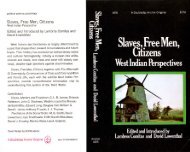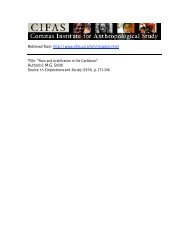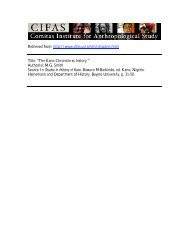e - CIFAS
e - CIFAS
e - CIFAS
Create successful ePaper yourself
Turn your PDF publications into a flip-book with our unique Google optimized e-Paper software.
40 GOVERNMENT IN ZAZZAU<br />
On any major issue, the Iring was by custom obliged first to<br />
consult his senior household officials, and next, the Tukuni or<br />
senior order of the public officials. that ls, the Madawaki, and the<br />
three eunuch rukuni, Galadima, Wombai, and Dallatu. Ifall these<br />
were agreed on the course to be pursued, the king could not resist<br />
their advice and in fact the power ofthe state would be against him<br />
ifhe did. On the other hand, proposals initiated by the Madawaki<br />
and the orders of public officials could be vetoed by the order of<br />
household officials under the Sarkin Fada (chief of the Palace).<br />
Where these two groups disagreed, the king was free to act independently<br />
as he thought fit. Sarkin Fada and the other household<br />
officials could influence the composition of the public orders by<br />
using their veto on proposed appointments, and by becoming pub~<br />
lie officials themselves. Inthis way also they could influence policy.<br />
But such promotion of household officials to the public orders required<br />
the co-operation of Madawaki and his group of senior<br />
public officials, and also the support of the king. Thus the household<br />
ofli.cials could not control policy decisions or appointments if<br />
the king and the Madawaki's group combined against them. At the<br />
same time, while the Icing had great administrative authority, he<br />
could not act politically against the combined will ofthe public and<br />
household orders.<br />
The household officials had no administrative authority or<br />
responsibility, but they enjoyed considerable political influence, as<br />
measured by their effect on appointments and policy. The public<br />
officials had great administrative responsibilities and authority,<br />
individually within their separate :fiefs. and as a group within the<br />
kingdom as a whole; but they had little power of independent<br />
political action in view ofthe veto power ofthe household officials.<br />
The chamber officials who were eunuchs were creatures of the<br />
king with no political power or independent administrative<br />
authority; but three ofthe most senior offices ofstate were reserved<br />
for them in the,ukuniorder, and from this position eunuchs could<br />
inftuence policy decisions and appointments.<br />
The process by which appointments were made to office makes<br />
it unlikely that personal clientage o1feroo a simple or direct basis<br />
for recruitment to office or for promotion. The Madawaki's clients<br />
could be kept out of office by the veto of household officials; and<br />
the Madawaki's group could oppose nominees of the Sarkin Fada;<br />
the king's personal clients would also have to be supported either<br />
GOVERNMBNT IN NINETEENTH.CBNTURY ABUJA 41<br />
"by the public or the household officials before he could appoint<br />
,them. Considering the delicacy ofthe distribution, as shown by the<br />
conditions governing appointment, it is unlikely that any single<br />
official, including the king, would have enjoyed sufficient support<br />
, to ensure the automatic appointment of personal clients.<br />
Although there was a formal heir apparent, the Dan Galadima,<br />
,the royal succession was not determined either by the king or by<br />
the royal lineage, but by certain traditional electors. These electors<br />
were all officials, and apart from the two most senior rukuni, the<br />
Madawaki, who held the highest office open to freemen, and the<br />
Galadima, who held the highest office open to eunuchs, the electoral<br />
council included three Koranic scholars or mallams; thus the<br />
mallams had a majority on the royal electoral council, and were<br />
able to hold a balance among the public officials in this one context,<br />
and also to decide the succession in a vIray which prevented dynastic<br />
struggle. On his accession, the new ruler found that the officials of<br />
state were not easily dismissable, individually or as a group, and<br />
that his own power of appointment to office was limited by<br />
; them.<br />
Titled office was associated with specific functions and tasks, but<br />
8& indicated earlier, titles do not fonn a single continuous series.<br />
'Titles were grouped into several orders of rank, they were also<br />
1', arranged according to specialized functions, and there were only<br />
:,very limited possibilities for the transfer of persons from one of<br />
these series to another. Thus the series of military offices was<br />
headed by the Madawaki, ofthe rukuni order, with certain junior<br />
\ public officials, rawuna, under him; but this military segment also<br />
'contained half of the household officials, who fonned another<br />
. order, and half of the slave-officials. The series of offices specially<br />
88sociated with civil administration, such as roads, ferries, police,<br />
lupplies and the like, was headed by the Galadima, and his<br />
two eunuch assistants of rukuni rank, with certain junior public<br />
officials of rtl'WWUl rank under him, the majority of these being<br />
'persons of free status; this series also included half of the order of<br />
household officials, under their chief, the Sarkin Fada, together<br />
with numerous slave-officials and the police who were directly<br />
{under Galadima's control. The vassal chiefs did not belong to<br />
,:either of these complex series, but they were individually res~<br />
;:: ponsible to the king through his chamber officials, who fanned the<br />
'king's Jines of communication to the heads ofthe various orders of





